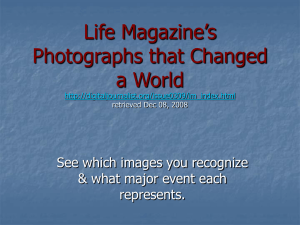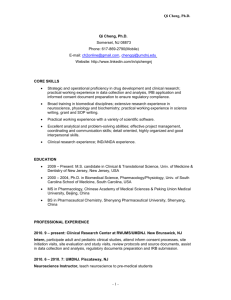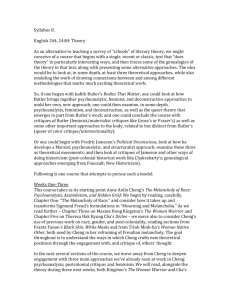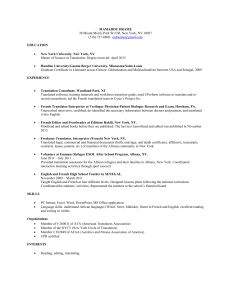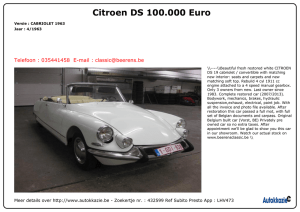here - University of Oregon
advertisement
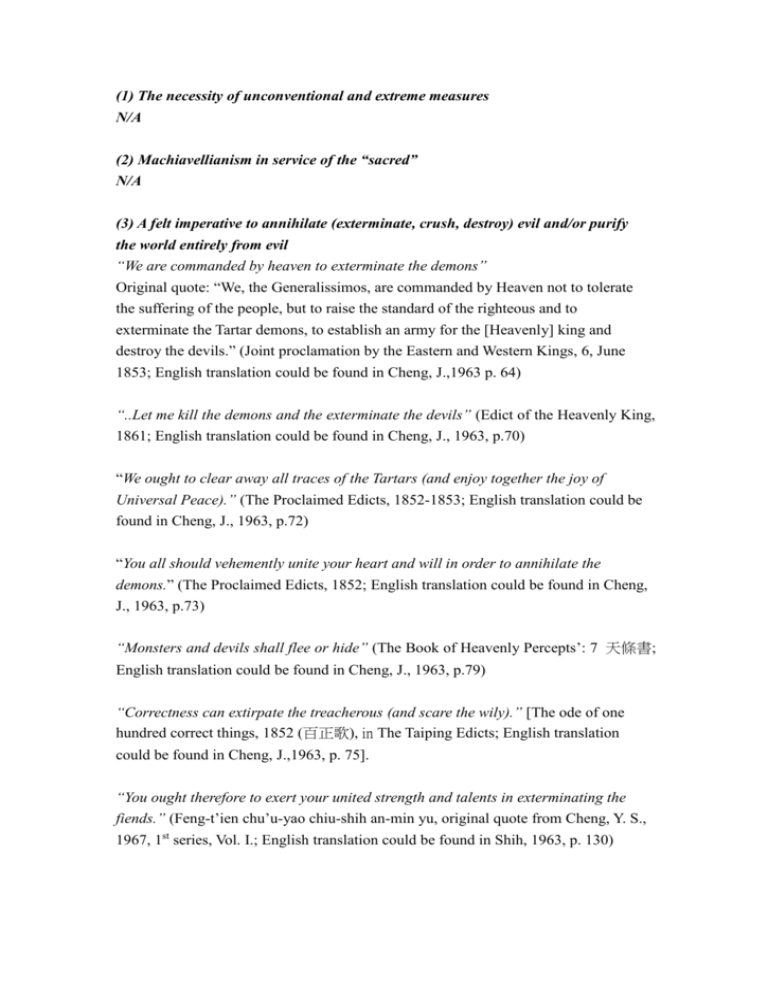
(1) The necessity of unconventional and extreme measures N/A (2) Machiavellianism in service of the “sacred” N/A (3) A felt imperative to annihilate (exterminate, crush, destroy) evil and/or purify the world entirely from evil “We are commanded by heaven to exterminate the demons” Original quote: “We, the Generalissimos, are commanded by Heaven not to tolerate the suffering of the people, but to raise the standard of the righteous and to exterminate the Tartar demons, to establish an army for the [Heavenly] king and destroy the devils.” (Joint proclamation by the Eastern and Western Kings, 6, June 1853; English translation could be found in Cheng, J.,1963 p. 64) “..Let me kill the demons and the exterminate the devils” (Edict of the Heavenly King, 1861; English translation could be found in Cheng, J., 1963, p.70) “We ought to clear away all traces of the Tartars (and enjoy together the joy of Universal Peace).” (The Proclaimed Edicts, 1852-1853; English translation could be found in Cheng, J., 1963, p.72) “You all should vehemently unite your heart and will in order to annihilate the demons.” (The Proclaimed Edicts, 1852; English translation could be found in Cheng, J., 1963, p.73) “Monsters and devils shall flee or hide” (The Book of Heavenly Percepts’: 7 天條書; English translation could be found in Cheng, J., 1963, p.79) “Correctness can extirpate the treacherous (and scare the wily).” [The ode of one hundred correct things, 1852 (百正歌), in The Taiping Edicts; English translation could be found in Cheng, J.,1963, p. 75]. “You ought therefore to exert your united strength and talents in exterminating the fiends.” (Feng-t’ien chu’u-yao chiu-shih an-min yu, original quote from Cheng, Y. S., 1967, 1st series, Vol. I.; English translation could be found in Shih, 1963, p. 130) (4) An elevation of intolerance, vengeance and warlikeness into virtues (or nearly so), including the ascribing of such militant dispositions to supernatural entities “God is angry, and loathes the turbulence of evil and suffering” (A later proclamation by the Kan Wang, 1859; English translation could be found in Cheng, J., 1963 p. 68) “(August) Heaven has lost patience and has commanded our Heavenly King to display respectfully the grandeur of Heaven to raise the banner of righteousness, sweep away the evil demons, clear China thoroughly and execute reverently Heaven's punishment.” (The Proclaimed Edicts, 1852-1853; quote translated in English could be found in Cheng, J.1963, p. 72) “All that is wanted is that all fight for righteousness, vehemently wave their banners to revenge themselves on the enemy” (The Proclaimed Edictet, 1852-1853; English translation could be found in Cheng, J., 1963, p.71) (5) Glorification of dying for the cause. (6) Duty and obligation to kill, or to make offensive war “A family, if incorrect, is full of odd and rebellious people… A country, if incorrect, is full of disputes and rivalry.” (The ode of one hundred correct things, 百正歌, in The Taiping Edicts; quote translated in English could be found in 1852, Cheng, J.,1963, p. 75). “Moreover you valiant men are many f you adherents f the Triad Society, and why do you not reflect that you have entered into the Hung society by blood covenant to exert your united strength and talents in exterminating the Manchus? [Feng-t’ien ch’u-yao chiu-shih an-min yu, 1980 edition (詩文鈔本- 德本) original quote in Lo & Shen (compiler), 1971; English translation could be found in Shih, 1963, p. 130] (7) Strong mixtures of military terminology and language into other areas of discourse where it is ordinarily rarely found “We raise the army of righteousness in order to wreak the vengeance of God on high on those who have decided Heaven.” (The Proclaimed Edicts, 1852-1853; quote translated in English could be found in Cheng, J., 1963, p. 78) (8)Anticipation of supernatural intervention “Although there be a million picked troops (against us), in an instant they will turn to dust.” (A patriotic poem, March 1853; quote translated in English could be found in Cheng, J., 1963, p. 68) “My body shines like dark gold and all calamities vanish, every Heavenly general and soldier comes to help.” (a poem written by Hung, 8 March, 1837; English translation could be found in Cheng J., 1963, p.11) “I, the Generalissimo, have respectfully received the command of Heaven to assist the True Lord in cleaning the universe” (Proclamation of Yang Hsiu-ch’ing, May, 1854; quote translated in English could be found in Cheng, J., 1963, p.65)” “I am about to assault the Capital (Nanking) on behalf of Heaven” (A Patriotic Poem, March 1853; quote translated in English could be found in Cheng, J., 1963, p. 68) “The moment the heavenly troops arrive, that is the moment when the imps and devils will perish.” [in T'ai P'ing T'ien Kuo Tsung shu, (天情道理書), 1854; reprinted in Hsaio, 1936, 5, p.29] “(Since we started this campaign of righteousness in Kwangsi, wherever we go, those who face the King’s armies come forward to surrender their arms, and) Those who tremble at the might of Heaven immediately lose their devilish recklessness” (Joint Proclamation by the Eastern and Western Kings, 6, June, 1853; English translation could be found in Cheng, J., 1963, p. 64) “Our Heavenly Father’s love for the people of the world was so deep that… he again sent our lord the Heavenly King [the T’ien Wang] to come on earth as the truly appointed lord to exterminate the devils.” [T’ai-p’ing chiu-shih ko (Taipin Songs of world Salvation), in T'ai P'ing T'ien Kuo Tsung shu, (天情道理書), 1854; reprinted in Hsaio, 1936, 5, p.29]; English translation could be found in Shih, 1963, p. 86) “Shangti (God) especially sent me into the world to exterminate his serpent” (Hung’s commentary on the bible; Forrest, 1867, p. 28) (9) Utopianizing “Those who obey Heaven shall be amply rewarded.” (The Proclaimed Edicts, 1852-1853; quote translated in English could be found in Cheng, J., 1963, p. 72) “When the rivers and mountains are secured, spears and shields will rest in peace” (A patriotic poem, March 1853; quote translated in English could be found in Cheng, J., 1963, p.63) “Universal peace will follow at once.” (A Later Proclamation by the Kan Wang, 1859; quote translated in English could be found in Cheng, J., 1963, p. 68) “The felicity of Paradise will not be won without efforts” (A Later Proclamation by the Kan Wang, 1859, quote translated in English could be found in Cheng, J., 1963, p.68) “Universal Peace under Heave will come gradually. The paradise will soon be in sight” (Edict of the Heavenly King, 1861; quote translated in English could be found in Cheng, J., 1963, p. 70) “Great fortune and great prosperity shall come.” (The book of Heavenly Precepts, 1852; quote translated in English could be found in Cheng, J., 1963, p.79). “Everything shall be satisfactory; great fortune and great prosperity shall come.” [The Book of Heavenly Percepts’: 7 (天條書); quote translated in English could be found in Cheng, J., p.79] “As you are allowed to spend the remaining days of your lives, the mercy and favors of Paradise will, of course, be bestowed on you in the end.” (Proclamation of Yang Hsiu-Ch’ing, May 1854; English translation could be found in Cheng, J., p.66) (10) Catastrophizing “Incorrectness eventually takes one to hell.” [The ode of one hundred correct things, (百正歌), in The Taiping Edicts, 1852; quote translated in English could be found in Cheng, J., 1963, p. 75]. “The incorrect riches are eventually annexed.” [The ode of one hundred correct things, (百正歌), in The Taiping Edicts, 1852; quote translated in English could be found in Cheng, J., 1963, p. 75]. “Those who oppose Heaven shall die conspicuously.” (The Proclaimed Edicts, 1852-1853; quote translated in English could be found in Cheng, J., 1963, p. 72) “If one is not upright, calamity will fall upon him as the result of his accumulated evil deeds” [Pai-Cheng-Ko, in Tai-Ping chao-shu, in Ch’eng Yen-sheng (compiler) T’ai-p’ing t’ien-kuo shih-liao, 1st Series, II, 4b; cited in Shih, 1963, p.39] “If the nobles are not upright, one day they will become oppressed; If the rich are not upright, one day they will be swallowed up by others” [“Pai-Cheng-Ko”, in Tai-Ping chao-shu, original quote in Cheng, Y. S. (compiler) T’ai-p’ing t’ien-kuo shih-liao, 1st Series, II, 4b; English translation could be found in Shih, 1963, p.39] “You do know, however, realize that, since the days of old, a revolutionary change of dynasty has invariably brought about the utter extermination of inhabitants and complete destruction of all valuables.” (Proclamation of Yang, Hsiy-ch’ing, May 1854; English translation could be found in Cheng, J., p. 66) (11) Perception that modernity, including the consumer society and even instances of successful economic progress, is actually a disaster for humanity “By following worldly practices and believing in demons, it is difficult to escape from hell in the end” (Epigram by Hung Hsiu-ch’uan, 1850; English translation could be found in Cheng, J., p.4) (12) The view that civil government is illegitimate N/A (13) Perception that “the ability of our group to reach its rightful position is being tragically obstructed.” “They stole our territory” Original quote “It is regrettable that the (ManChus) stole (China's) territory.” (From the Proclaimed Edicts, 1852-1853; quote translated in English could be found in Cheng, 1963, p. 72) “It is regrettable that since the Mahcus spread poison they defiled China.” (The Proclaimed Edicts, 1852-1853; English translation could be found in Cheng, J. p.71). “(We believe that the empire belongs to the Chinese and not to the Tartars; the food raiment found therein belong to the Chinese and not to the Tartars; the men and women are subjects and children of the Chinese and not of the Tartars). But Alas! Ever since (the Ming misgoverned,) the Manchus availed themselves of the opportunity to throw China into confusion and deprive the Chinese of their empire; they also robbed them of their food and clothing, as well as oppressed and ravished their sons and daughters…” (in “Feng-t’en t’ao-hu his pu ssu-fang yu,” original quote in Luo & Shen (compilers), 1971; English translation could be found in Shih, 1963, p.131). “At a time when China was destitute of heroes they seized upon the government of Hua-hisa (China); the wild devil thus ascended the imperial throne, and monkeys were capped in court; while our Chinese...allowed themselves to be insulted by them and obeyed their orders; and what is worse, the civil and military officers, coveting the gains of office…” (in “Feng-t’en t’ao-hu his pu ssu-fang yu,” quote originally in Luo & Shen (compilers), 1971; English translation could be found in Shih, 1963, p.131). “Alas, since the Tartar slaves invaded China, they have taught people to worship their false idols, to renounce the true faith and to betray God by shaking the people’s beliefs.” (Joint Proclamation by the Eastern and Western Kings, 6, June, 1853; English translation could be found in Cheng, J., 1963, p. 64) (14) Dehumanizating or demonizing opponents “The (Manchu) demons are different from men.”(From Joint proclamation by the Eastern and Western Kings, 6, June, 1853; quote translated in English could be found in Cheng, 1963, p. 64) “Incorrect men are not human beings.” (The ode of one hundred correct things, 1852 (百正歌), in The Taiping Edicts, 太平昭書, 1852; quote translated in English could be found in Cheng, 1963, p. 75) “Incorrect women are really evil spirits.” (The ode of one hundred correct things, 1852 (百正歌), in The Taiping Edicts, 太平昭書, 1852; quote translated in English could be found in Cheng, 1963, p. 75) “China is the head, and Tarary the foot; China is the Holy Continent, and Tatary that of evil spirits.” (The Proclaimed Edicts, 1852-1853; English translation could be found in Cheng, J., 1963, p. 71) Note: Terms such as “yao-tso” (妖座, devil seat), she-wo (蛇窩, snake’s den), “ho-cha” (嚇詐, intimidating and blackmailing), “yung-o luo-lueh” (庸惡醜劣, the useless, the wicked, the mean, and the depraved), and “ying-t’o” (蠅頭, fly heads, referring to small profits) were used to described the Mahchu (Shih, 1963, p. 133). (15) Use of other tactics that function to absolve one of responsibility for the bad consequences of the violence one is advocating or carrying out Reference Cheng, J. C. (1963). Chinese sources for the Taiping Rebellion 1850-1864. Hong Kong: HongKong University Press. Cheng, Y. S. (Compiler, 1967). Tai pin tian guo shi liao. Taipei: Wen hai chu ban she. Forrest, R. J. (1867). The Christianity of Hung Tsiu Tsuen: A review of Taeping Books. Journal of the Royal Asiatic Society of Great Britain and Ireland, North China Brance, New Series No. 4, p. 187-208. Hsiao, I. S. (1936). T'ai P'ing T'ien Kuo Tsung shu (太平天國叢書). Shanghai, 10 vols. 5 Luo, Yong & Zuji Ji (Compilers, 1971). Tai pin tian guo shi wen chao. Taipei: Wen hai chu ban she. Shih, V. Y. C. (1963). The Taiping Ideology: Its sources, interpretations, and I nfluences. Seattle: University of Washington Press.
